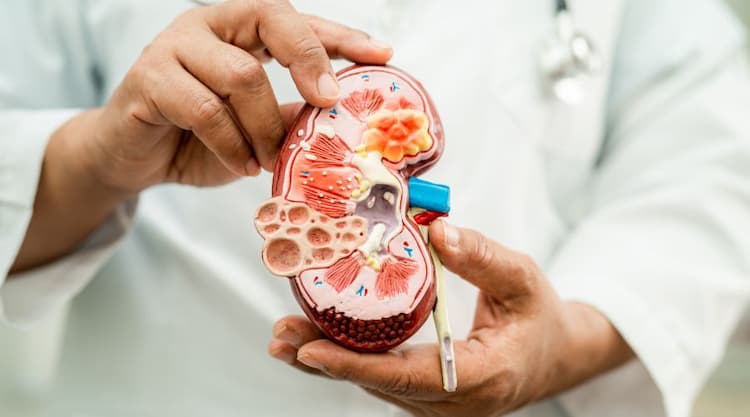How to Reduce Inflammation in Body: Causes & Diet To Reduce It

Medically Reviewed By
Dr Sohini Sengupta
Written By Komal Daryani
on Feb 3, 2024
Last Edit Made By Komal Daryani
on Mar 15, 2024

Inflammation is a part of your body’s defense system that protects you. It is your body’s immune system recognizing and removing harmful and foreign substances and beginning the healing process. Inflammation is of two types – Acute or Chronic.
Acute Inflammation: Acute inflammation can be brought on by toxic chemicals, microbial invasion, or tissue damage from trauma. It begins quickly, gets worse quickly, and its symptoms—such as cellulitis or acute pneumonia—may linger for a few days.
Chronic inflammation: Slow, protracted inflammation that lasts for several months to years is known as chronic inflammation. The etiology of the injury and the body’s capacity for healing and recovery generally influence the degree and consequences of chronic inflammation.
Is Inflammation Good Or Bad?
Your body uses inflammation as a defense mechanism, but it can spiral out of control. It’s beneficial when it serves as a shield against diseases like the common cold or cuts and scrapes. However, long-term accumulation of chronic inflammation can harm organs and tissue, resulting in conditions like type 2 diabetes, rheumatoid arthritis, and cardiovascular disease. Consequently, you might consider including the best anti-inflammatory foods in your regular diet.
Causes of Inflammation?
Reasons for Acute Inflammation: Acute inflammation is a transient process that aids in healing injured tissues and the defense against infections. This may occur as a result of:
- Parasites, fungi, viruses, and bacteria cause infections.
- Physical harm like a fracture, sprain, or cut.
- Tissue damage from burns, chemicals, and other sources.
- Diseases triggered by antibodies
- Allergic response to food or pollen.
Chronic inflammation’s causes: It is an ongoing inflammatory reaction that can potentially harm organs and tissues. It’s frequently connected to underlying illnesses that the body can’t heal, such as:
- Long-term diseases like hepatitis and tuberculosis.
- Diseases caused by antibodies.
- Prolonged exposure to pollutants in the environment.
- Mythological syndrome and obesity.
- Ongoing stress
Ways of Reducing Inflammation Naturally
The anti-inflammatory diet is typically based on whole, nutrient-dense food that contains antioxidants. These foods work by reducing the levels of free radicals, which are reactive molecules that may cause inflammation.
Some Anti-Inflammatory foods that must be included in your diet are:
Diet To Reduce Acute Inflammation:
- Haldi (Turmeric):
- Mixing turmeric with ginger and honey: The anti-inflammatory properties of curcumin in turmeric are boosted by gingerol in ginger. Honey adds sweetness and soothes any sore throat.
- Moong dal cheela with turmeric: Packed with protein and fiber, moong dal absorbs turmeric beautifully.
- Golden milk: Warm milk with turmeric and black pepper (enhances curcumin absorption) is a classic comfort drink.
- Soups & Stews:
- Spicy vegetable rasam: Broth-based lentil soup with warming spices like black pepper, cloves, and cinnamon.
- Kadha: Turmeric, pepper, ginger, and herbs like tulsi simmered in water are traditional remedies for colds and infections.
- Soup: Tomato soup with coriander, cumin, and turmeric is rich in antioxidants and anti-inflammatory compounds.
- Yogurt:
- Light and refreshing dip for meals, with cooling cucumber and anti-inflammatory mint.
- Probiotic yogurt blended with seasonal berries and warming cardamom soothes inflammation and aids digestion.
- A traditional drink, buttermilk mixed with haldi aids in gut health and has an anti-inflammatory punch.
- Fruits & Nuts:
- Fruits such as amla, guava, and jamun are high in antioxidants and vitamin C and have anti-inflammatory qualities.
- Seeds and nuts are rich sources of anti-inflammatory omega-3 fatty acids such as walnuts, pumpkin, sunflower, and almond seeds.
- Apple paired with cinnamon are great because they are full of fiber and antioxidants.
- Hydration:
- Coconut water is a natural electrolyte replenisher and nutrient-rich anti-inflammatory beverage.
- Herbal teas with tulsi, ginger, and peppermint have antioxidant and anti-inflammatory qualities and are soothing and warming.
- Keeping the water content in the body is vital for overall health and reduces inflammation.
Diet To Manage Chronic Inflammation:
- Dal & Pulses:
- Dal is packed with fiber and protein. Lentil contains polyphenols that have anti-inflammatory properties.
- Kidney beans with rajma curry are high in fiber and are known as heart-healthy food.
- Dal Khichdi is good for the gut as they are light and nutritious.
- Whole Grains:
- Compared to white rice, brown rice has more nutrients and fiber, which helps to regulate blood sugar.
- Rotis Jowar & Bajra are rich in fiber and antioxidants.
- Simple and light breakfast options, poha or upma, are made with flattened rice or semolina, which are high in carbohydrates and fiber.
- Seasonal Veggies & Fruits:
- Vegetables with a leafy green color, such as fenugreek, spinach, and kale, are high in antioxidants, vitamins, and minerals.
- Vegetables with vibrant colors, such as bell peppers, broccoli, and carrots, are abundant in phytochemicals and antioxidants.
- Fruits that are in season are high in antioxidants, including vitamin C.
- Healthy Fats & Spices:
- Cold-pressed oils such as sesame, mustard, and groundnut oil are rich in fatty acids like omega-3 and omega-6.
- Consuming anti-inflammatory spices like garlic, ginger, and turmeric is good for your body as they are all anti-bacterial.
- Ghee contains conjugated linoleic acid (CLA). It has anti-inflammatory properties because it contains saturated fat.
- Hydration & Gut Health:
- Warm water with honey and lemon hydrates helps digestion and soothes inflammation.
- Buttermilk or kefir are two examples of probiotic drinks that support gut health.
- Herbal teas, such as tulsi and chamomile, have a calming effect. These teas are effective in enhancing digestion.
Inflammation is your body’s way of protecting you from unknown pathogens and keeping you safe. But when prolonged, it can mean something wrong with your body. Understanding why it happens and adopting these diets can help you manage inflammation. But, before making any type of dietary changes, consult your dietician. Finding the right cause of inflammation will help you pave the way to managing it the smart way.



